Looking for the best allergy medicine for your dog? You’re not alone. Allergies in dogs are both diverse and prevalent, manifesting in symptoms ranging from mild itching to severe skin inflammation. As the world of veterinary medicine advances, we’re presented with a myriad of treatment options tailored to address these reactions. This article dives into trusted over-the-counter and prescription medicines, offering insights into their efficacy and application. We’ll also explore holistic remedies, spotlighting natural supplements and their benefits. Beyond medications, we’ll touch upon innovative treatments like allergy shots and the power of elimination diets. Join us in this concise review to understand and combat canine allergies effectively.
In this article, we’ll cover 4 areas of dog allergy medicines, supplements, and treatments:
- Best All Natural Allergy Supplements for Dogs (skip here)
- Best Over the Counter (OTC) Allergy Medicines for Dogs (skip here)
- Best Prescription Medicines for Dogs (skip here)
- Best Alternative Allergy Treatments for Dogs (skip here)
But first, a word of caution. This article should be a starting place for your research, but always speak with your dog’s veterinarian before starting any new allergy treatment plan.
Best Natural Allergy Medicines & Supplements for Dogs
1. iHeartDogs Allergy & Itch Relief Chews for Dogs
If your dog is dealing with irritated skin, the iHeartDogs Allergy & Itch Chews can soothe them. Using only the highest quality ingredients, the dog allergy chews provide relief while supporting a healthy immune system and aiding digestion for all-around canine health. These chews include a blend of natural ingredients that boost your dog’s immune system to help relieve seasonal, food, and environmental allergies that can cause itching, sneezing, scratching, skin irritation, and paw chewing.
This supplement is rich in omega-3 and omega-6 fatty acids, which support a healthy immune system, heart health, anti-inflammatory properties, healthy skin and coat, and cognitive function. Some of the other key ingredients include quercetin, colostrum, Reishi mushrooms, salmon oil, and apple cider vinegar. The recipe is veterinarian formulated, and every product purchased helps feed dogs in need.
Key Features:
- Helps alleviate itching and calms skin irritation
- Excellent multivitamin for multiple health benefits
- It has strong antioxidant and anti-inflammatory properties
- It helps promote healthy digestion, intestinal balance, and a strong immune defense
In a Nutshell:
These soft chews look, smell, and taste like treats for dogs, so they’re great supplements for picky eaters. However, it could take a while for the natural ingredients to take effect.
Pros
- Suitable for puppies
- Easy to serve
- Helps alleviate itching and calms skin irritation
- Veterinarian formulated
- Made in the USA
- Every purchase donates meals to shelter dogs
Cons
- May take a while to see results
2. PetHonesty Dog Allergy Relief Chews Max Strength
PetHonesty is dedicated to providing high-quality health supplements with natural ingredients. This company makes some of the best dog allergy supplements in the USA without sacrificing the quality of ingredients, manufacturing, and packaging.
This formula contains a blend of probiotics to “coat” the gut with good bacteria and support digestive functions. The supplements contain colostrum for immunity and fish oil for healthy skin and coat. Thus, each chew contains omega-3 fatty acids too. All the ingredients are natural, and the formula is recommended by vets.
Key Features:
- Supports normal and healthy inflammatory pathways
- Helps soothe seasonal allergy-related skin issues
- Helps support your dog’s immune system
- Made of colostrum, probiotics, coconut oil, and quercetin
In a Nutshell:
Your dog should be monitored closely when taking these supplements for the first time, but most dog parents have noticed improvements in their sensitive pup’s skin, coat, and digestive system after eating them.
Pros
- All-natural ingredients
- Dog-friendly flavor
- Vet-approved formula
- Helps improve skin/coat health
Cons
- Some dogs experience digestive issues
3. Zesty Paws Advanced Allergy Immune Supplement
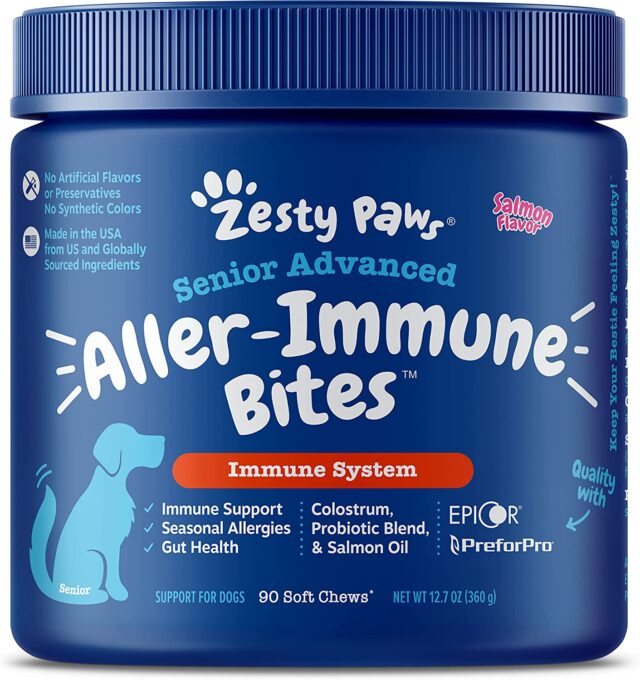

Taking care of our beloved furry friends is essential for their long-term happiness. Zesty Paws Advanced Aller-Immune Bites offer extra TLC for your canine companion, no matter their age or size. You can choose unique formulas for seniors, puppies, small dogs, and all ages. There’s also a vet-formulated option.
These supplements support immune function, help dogs with seasonal allergies, and help maintain histamine levels. The soft chews contain vitamins, protein, fiber, colostrum, omega-3 fatty acids, antioxidants, prebiotics, and probiotics. Together, the ingredients in this functional pet supplement support dogs with seasonal allergies, especially when it comes to immune, skin, and gut health.
Key Features:
- Each chew features five strains of probiotics and PreforPro (prebiotics)
- EpiCor is a premium ingredient made from natural yeast
- Advanced Aller-Immune Bites may also help maintain normal histamine levels
In a Nutshell:
Some dogs are picky with these chews, but dogs of all ages and breeds tend to experience decreased allergy symptoms after taking the supplements.
Pros
- No artificial flavors or preservatives
- Includes salmon oil
- Seasonal allergy support
- Supports gut function
- Formulas for dogs of all ages and sizes
- You can get 20% off your order on Zesty Paws’ website if you sign up for emails and texts
Cons
- Some reports of vomiting and lethargy
4. PetHonesty Allergy Anti-Itch Salmon Oil Supplement
PetHonesty Anti-Itch Allergy Supplement for Dogs is another liquid supplement. It combines the smells and flavors of salmon oil and turkey to appeal to picky pups. The supplement can be given directly, but it is easier to mix with food or treats.
This product has natural ingredients, including omega oils, colostrum, immune modulators, and probiotics, that work to soothe allergy-related itching and other skin conditions. The ingredients are free of allergens and common food sensitivity triggers like wheat, corn, preservatives, and GMOs. These supplements are a vet-recommended form of allergy support.
Key Features:
- Made with salmon oil, colostrum, and mushroom blend without fillers
- Helps support itchy and dry skin
- Supports skin, coat, joint, and immune health.
- Vet-recommended for skin, allergy, and immune support
In a Nutshell:
Since this is a natural supplement, it will take time for the ingredients to support the immune system, so don’t expect it to start working immediately. Despite the aroma of salmon oil and turkey, some dogs might not find the flavor appealing.
Pros
- Easy to use
- Natural ingredients
- Free from allergens
- Promotes skin health
- NASC quality seal of approval
Cons
- Takes time to offer full allergy support
5. Vetnique Labs Dermabliss Dog Supplements
Vetnique Labs Dermabliss Allergy Chews are designed to help dogs suffering from hay fever or allergic reactions. It uses a combination of omega fatty acids, vitamins, probiotics, quercetin, and colostrum. You can buy these supplements in packs of 30, 60, or 120, depending on how often your dog needs them.
Dermabliss benefits dogs with seasonal allergies, atopy, and other skin conditions because it promotes normal inflammatory responses and supports the immune system. The unique combination of omega 3-6-9 fatty acids helps support a healthy gut, which means a healthy pup. The fatty acids can also keep your dog’s skin and coat healthy overall.
Key features:
- Helps “ditch the itch” by supporting dogs with allergies
- Made with natural ingredients, including salmon oil
- Combines immune modulators, probiotics, and colostrum
In a Nutshell:
Some pet parents complained that their dog would only eat it if it were mixed with food, but most customers saw improvement in their dog’s internal and external allergic reactions.
Pros
- Soft chews are easy to serve
- No artificial preservatives
- NASC quality seal of approval
- Rich in omega 3-6-9
Cons
- The strong smell might deter some dogs
6. PetAlive Allergy Itch Ease Granules
Help your furry friend feel strong and comfortable in their skin with PetAlive Allergy Itch Ease Granules. This homeopathic supplement relieves common skin irritations, including allergies, eczema, red spots, mottled skin, and itching.
Allergy Itch Ease is a natural remedy with ingredients that relieve itching and other allergic reactions. It works to promote healthy skin on all levels. Supporting sensory balance and proper oxygen supply can help strengthen the skin and even reduce licking and scratching behaviors that can worsen skin irritations. To use mix it with your pet’s food as directed.
Key Features:
- Combats itchy and irritable skin from allergies
- Supports the health of all cells and layers of the skin
- Homeopathic treatment
- Increases oxygen supply to the skin to help strengthen it and reduce itching
In a Nutshell:
Even though this supplement isn’t a soft treat like some of the others, it’s easy to serve because it can be mixed with your dog’s food for allergy relief.
Pros
- Relieves itchy skin
- Stops pets from scratching
- Soothes skin allergies
- Calms your pet
Cons
- Vague dosage instructions
7. Finn Allergy & Itch Supplement for Dogs
New to the dog supplement industry, Finn’s all-natural products are quickly becoming popular with puppy parents. These supplements have been extensively researched and formulated with real, natural ingredients without unnecessary fillers or artificial preservatives.
These supplements contain colostrum, wild Alaskan salmon oil, quercetin, bromelain, probiotics, bee propolis, and other key ingredients to help support your dog’s immune response and soothe itchy, dry skin. These chews are formulated to relieve seasonal allergies in dogs and are cold-pressed to preserve the strength of the ingredients. They contain real cheese, bacon, and beef liver, most dogs’ favorite flavors.
Key Features:
- Formulated to support seasonal allergies and skin health
- No corn, soy, or artificial ingredients
- NASC quality seal of approval
In a Nutshell:
Some customers have complained about the strong smell, but most dogs love it. It’s easy to serve because dogs think it’s a treat when it’s really reducing allergy symptoms.
Pros
- BPA-free, recyclable tin
- Made in the USA
- Suitable for puppies
- Vet-recommended
- Appealing flavors for dogs
Cons
- The smell is strong
8. BEXLEY LABS Curaseb Medicated Treatment for Dogs
Bexley Lab’s product is ideal if your dog has skin-related allergy symptoms, such as skin infections or hot spots. The company is dedicated to providing high-quality products to help your dog fight skin infections and get instant relief.
This dog allergy supplement is easy to apply as it can be sprayed. Curaseb Medicated Spray is safe for pets of all ages. It’s an alcohol-free solution for dogs, cats, and even horses with skin problems caused by unwanted foreign visitors. It contains aloe vera and vitamin E to help nourish and soothe various skin irritations. This supplement is formulated and recommended by veterinarians.
Key Features:
- Aids in the treatment of skin infections, red patches, and acne
- Contains aloe and vitamins for proper skin hydration
- Delivers immediate relief from rashes
In a Nutshell:
The spray is easy to apply, but it has an overpowering smell. Customers noted that it seems to heal allergy symptoms faster than oral products.
Pros
- Natural ingredients
- Made in the USA
- Liquid drops are easy to administer
- Safe and efficient for both dogs and cats
- Recommended and formulated by vets
Cons
- The fragrance is overpowering
9. PetArmor Antihistamine Allergy Relief for Dogs
This dog allergy supplement comes in unflavored pills, so you’ll likely need to crush the pills and mix them with wet food. A pill pocket may also be a good way to serve them. These supplements are an easy-to-use at-home solution to help relieve sensitive, itchy skin and soothe insect bites and stings.
PetArmor Antihistamine Medication for Dog Allergies contains diphenhydramine, the same compound found in Benadryl Ultra tablets. The antihistamine works to regulate and normalize histamine levels in your dog. While the tablets are designed to combat allergy symptoms, including seasonal allergies, they are also effective against insect bites. PetArmor also recommends these tablets for travel anxiety.
Key Features:
- The tablets are easy to swallow
- An excellent option for insect bites and stings
- Formulated with the same active ingredient as Benadryl Allergy Ultra Tablets
- It may be given to your canine to help ease travel anxiety
In a Nutshell:
Some users reported that the pills were difficult to give, but most of the dogs that took the supplement were happier and more comfortable.
Pros
- Effective for insect bites
- It can help combat itchy skin
- Affordable at-home treatment
- Suitable for all dog sizes
Cons
- It might be hard to give to picky dogs
10. StrellaLab Allergy Relief with Omega-3 Dog Chews
This supplement is designed to aid the digestive system, improve your dog’s immune system, and provide relief from uncomfortable allergy symptoms. This allergy-relieving immune treatment contains salmon oil rich in omega-3 fatty acids. Thus, the supplements are highly effective in tackling common seasonal and food allergy symptoms such as itching, shedding, or sneezing.
Each bite offers an exceptional blend of omega fatty acids, digestive enzymes, essential vitamins, and minerals, all promoting overall health from nose to tail. By encouraging a strong immune response and healthy digestion, these chews can help keep your dog’s allergies under control. They can relieve common symptoms, such as itching, redness, sneezing, and excessive paw licking. Plus, omega-3 fatty acids maintain healthy skin and a soft, shiny coat.
Key Features:
- Made in the USA
- No dangerous preservatives, flavor enhancers, or fillers
- Made with omega-3 fatty acids to help maintain healthy skin and a shiny coat
- Chicken-flavored soft chews take advantage of digestive enzymes
In A Nutshell:
It can be effective against skin allergies, insect bites, and other allergic reactions, and even picky dogs seem to love the flavor. However, some dogs may have difficulties digesting it.
Pros
- Made in top-quality facilities
- Boosts immune systems
- Easy-to-serve chews
- Effective for insect bites
- Can combat itchy skin
Cons
- Some dogs may not be able to digest it well
11. Native Pet Allergy Air-Dried Chews
The Native Pet Allergy Chews are air-dried treats made with real chicken, so your pup can enjoy a chicken-flavored snack without realizing it’s also an allergy supplement. Vets developed the product, and it can support your dog’s immune system and reduce their seasonal allergies. These chews can reduce red eyes, sneezing, and other discomfort dogs face.
This product only has nine ingredients: colostrum, spirulina, dried yeast fermentate, algae oil, bacillus coagulans, bone broth gelatin, chicken, coconut glycerin, and mixed tocopherols. Thus, you’ll know exactly what’s going into your dog’s body so you won’t have to worry about triggering any sensitivities.
Key Features:
- Air-dried treats made with real chicken.
- Developed by vets to support the immune system and reduce seasonal allergies.
- Only contains nine ingredients.
- Reduces discomfort in dogs, such as red eyes and sneezing.
In A Nutshell:
These air-dried chicken supplements look like treats to most dogs, so they’re easy to serve while effectively reducing allergy symptoms. However, dogs who are allergic to chicken can’t eat these.
Pros:
- Real chicken flavor
- Boosts immune systems
- Reduces seasonal allergies
- Limited ingredient formula
- Vet-formulated
Cons:
- Not suitable for dogs with chicken allergies
Best Over-the-Counter (OTC) Allergy Medicines for Dogs
Allergies in dogs can manifest in a variety of ways, including itching, redness, sneezing, and digestive issues. OTC medications can provide relief from these symptoms, but it’s essential to choose the right one for your dog. This article will review some of the best OTC allergy medications for dogs, highlighting their pros and cons.
1. OTC Antihistamines for Dogs
a. Benadryl for Dogs (Diphenhydramine)
Dosage: The typical dose is 1 mg per pound of body weight, given 2-3 times a day. For instance, a 25-pound dog would get 25 mg of Benadryl.
Pros:
- Widely available and well-tolerated in most dogs.
- Can help reduce itching, sneezing, and runny nose.
- Has mild sedative effects, which can be beneficial for dogs with anxiety-related allergies.
Cons:
- Sedative effects might not be suitable for all dogs, especially those that are already lethargic.
- Not all dogs respond to Benadryl, and higher doses might be needed for larger breeds.
b. Claritin for Dogs (Loratadine)
Dosage: The general dosage is 0.5 mg per pound of body weight once a day.
Additional Information: It’s essential to use the plain Claritin formula, not Claritin-D, which contains pseudoephedrine and can be toxic to dogs.
Pros:
- Non-drowsy formula.
- Effective for treating symptoms like sneezing, itching, and watery eyes.
- Longer-lasting effects than some other antihistamines.
Cons:
- Some dogs might experience stomach upset.
- Not as potent as other antihistamines in some dogs.
c. Zyrtec for Dogs (Cetirizine)
Pros:
- Suitable for daily use.
- Effective against symptoms like itching and sneezing.
Cons:
- Some dogs might experience drowsiness or stomach upset.
Dosage: Typically, 0.5 mg per pound of body weight once daily.
Additional Information: Like Claritin, ensure you are giving plain Zyrtec and not Zyrtec-D.
2. Omega-3 Fatty Acids for Dog Allergies
Pros:
- Natural anti-inflammatory properties can help reduce allergic reactions.
- Benefits the dog’s skin, coat, joints, and overall health.
- Available in various forms, including fish oil supplements and flaxseed oil.
Cons:
- Might take longer to see results compared to antihistamines.
- Some dogs might not like the taste.
3. Oatmeal-based Topical Products
Pros:
- Provides immediate relief from itching and redness.
- Moisturizes the skin and strengthens its barrier.
- Suitable for dogs with sensitive skin.
Cons:
- Only offers temporary relief.
- Not suitable for treating systemic allergic reactions.
4. Hydrocortisone Creams for Dogs
Pros:
- Directly reduces inflammation and itching when applied to the affected area.
- Faster action compared to oral medications.
- Suitable for localized allergic reactions.
Cons:
- Overuse can lead to thinning of the skin and other side effects.
- Not suitable for large areas or systemic reactions.
5. Probiotics for Dog Allergies
Pros:
- Helps strengthen the dog’s immune system.
- Can reduce the frequency and severity of allergic reactions.
- Benefits the dog’s digestive health.
Cons:
- Results can vary between dogs.
- Might take longer to see benefits compared to other treatments.
While there are several OTC allergy medications available for dogs, it’s essential to choose the one that best suits your dog’s specific needs. Always consult with your veterinarian before introducing any new medication or supplement to your dog’s routine. Remember, while OTC treatments can offer relief, they might not address the root cause of the allergy. Identifying and eliminating allergens from your dog’s environment is the most effective long-term solution.
Best Prescription Allergy Medicines for Dogs
For some dogs, over-the-counter (OTC) remedies or natural supplements might suffice, but for others, especially those with severe or chronic allergies, prescription medications are the best course of action. In this section, we’ll explore some of the best prescription allergy medicines for dogs, their pros and cons, and potential side effects.
1. Apoquel (Oclacitinib)
Pros:
- Rapid Relief: Apoquel begins working within 4 hours of administration, providing fast relief from itching and inflammation.
- Targeted Action: It specifically targets the cytokines involved in allergic reactions, ensuring minimal off-target effects.
- Safe for Long-Term Use: Apoquel has been demonstrated to be safe for daily use, even for an extended period.
Cons:
- Not for Very Young Dogs: Apoquel is not recommended for dogs younger than 12 months.
- Cost: It can be pricier than other treatments, especially for larger dogs.
Side Effects: Possible side effects include vomiting, diarrhea, and an increased susceptibility to infections. Always consult with your veterinarian regarding the dosage and any observed reactions.
2. Cytopoint (Lokivetmab)
Pros:
- Long-Lasting: One injection can provide relief from itching for 4 to 8 weeks, reducing the need for frequent medication.
- Specific Target: Cytopoint targets the specific itch-causing protein in dogs, making it highly effective.
- Non-Pharmacologic: It’s a biological therapy, not a drug, which means it doesn’t have the same kind of side effects as traditional medications.
Cons:
- Administration: Unlike oral medications, Cytopoint requires an injection by a veterinarian.
- Cost: The upfront cost for an injection can be higher than other treatments.
Side Effects: Very few side effects have been reported. Some dogs might experience a reaction at the injection site, but it’s generally rare.
3. Atopica (Cyclosporine)
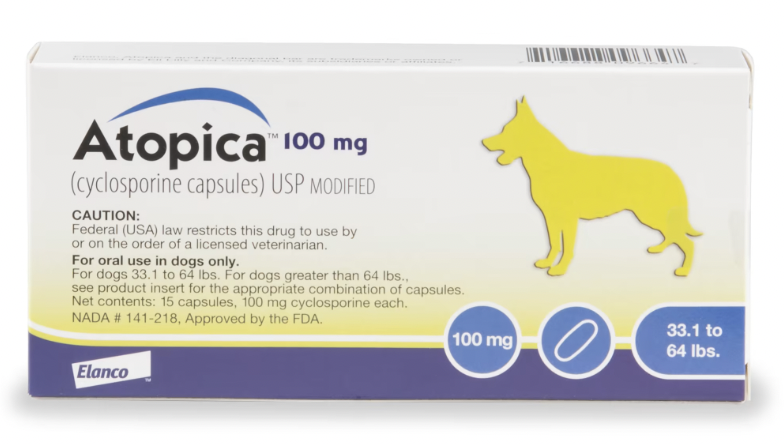
Pros:
- Proven Efficacy: Atopica has been around for a while and has been proven effective for treating atopic dermatitis in dogs.
- Immunosuppressant: It works by suppressing the immune system’s response, providing relief from allergic symptoms.
Cons:
- Slow Onset: It might take several weeks before the full benefits of the drug are seen.
- Not for Every Dog: Dogs with a history of neoplasia or those with kidney problems should not take Atopica.
Side Effects: Common side effects include vomiting, diarrhea, and a reduced appetite. In some cases, gum overgrowth or skin growths might occur.
4. Steroids (Prednisone, Prednisolone)
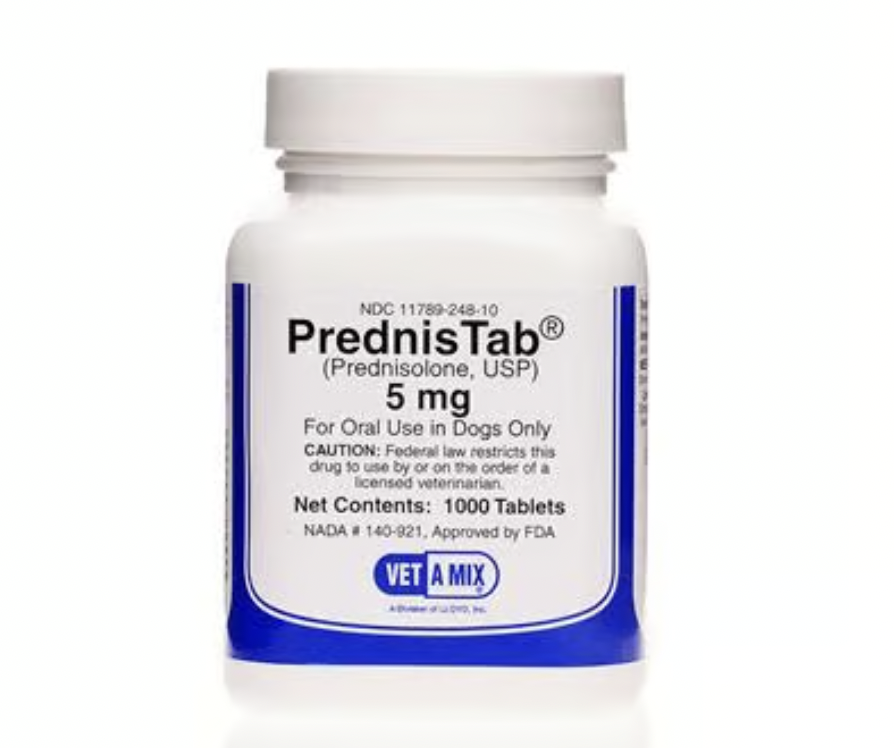
Pros:
- Fast Acting: Steroids can provide quick relief from allergic reactions and inflammation.
- Versatility: They can be used for a variety of allergic conditions.
Cons:
- Short-Term Use: Due to potential side effects, they are usually prescribed for short-term relief and not as a long-term solution.
- Impact on Immune System: Steroids suppress the immune system, which can make dogs more susceptible to infections.
Side Effects: Possible side effects include increased thirst, hunger, and urination. Long-term use can lead to more severe side effects like immune suppression, Cushing’s disease, and pancreatitis.
5. Antihistamines (Hydroxyzine, Chlorpheniramine)
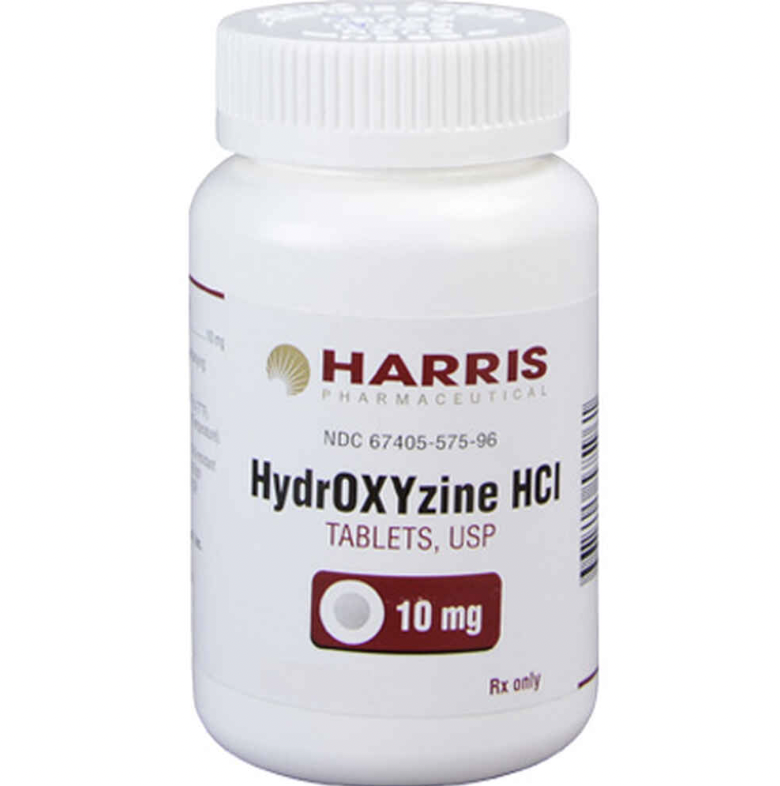
Pros:
- Tried and True: Antihistamines have been used for years to treat allergies in both humans and dogs.
- Multiple Uses: They can be used for various allergic conditions, including insect bites, pollen, and certain foods.
Cons:
- Varied Efficacy: Not all dogs respond to antihistamines, and they might not be effective for severe cases.
- Drowsiness: Some antihistamines can cause drowsiness in dogs.
Side Effects: Potential side effects include drowsiness, dry mouth, urinary retention, and in some cases, hyperactivity.
Choosing the right prescription allergy medicine for your dog depends on the severity and type of allergy, the dog’s overall health, age, and other factors. It’s essential to work closely with your veterinarian to find the best solution for your pet. Regular check-ups and monitoring are crucial when starting a new medication to ensure its efficacy and monitor for any potential side effects. Remember, the goal is always to improve your dog’s quality of life and keep them comfortable and happy.
Best Alternative Allergy Treatments for Dogs
While conventional treatments such as prescription drugs, over-the-counter drugs, and natural supplements have their place, some pet owners are seeking alternative treatments for their furry friends. This section delves into the world of alternative allergy treatments for dogs, highlighting their potential benefits and the science behind their effectiveness.
1. Allergy Immunotherapy (Allergy Shots)

Allergy immunotherapy, commonly known as allergy shots, is one of the most widely recognized alternative treatments for both humans and dogs.
How It Works: Allergy shots work by gradually exposing the dog to increasing amounts of the allergen causing the reaction. Over time, this can help the dog’s immune system become less reactive to the allergen.
Benefits:
- Long-term Relief: Immunotherapy aims to provide long-lasting relief from allergies, rather than simply treating the symptoms.
- Reduced Medication: Successful immunotherapy might reduce the need for other allergy medications.
Considerations:
- Time Commitment: The treatment involves regular injections over several months to years.
- Not for Every Dog: Not all allergens are suitable for immunotherapy, and not all dogs will respond to the treatment.
2. Hydrotherapy for Dog Allergies

Hydrotherapy involves the use of water to treat various conditions, including allergies.
How It Works: For dogs with skin allergies, hydrotherapy sessions in clean, filtered water can help cleanse the skin of allergens and soothe irritations. The water’s buoyancy and resistance can also provide therapeutic exercise.
Benefits:
- Soothing: Water can be calming and can help reduce inflammation and itching.
- Physical Exercise: The exercise aspect can boost overall health, which might help alleviate some allergy symptoms.
Considerations:
- Facility Quality: It’s essential to choose a hydrotherapy facility that maintains clean and appropriately treated water to avoid introducing new allergens or irritants.
3. Acupuncture for Dog Allergies
Acupuncture, an ancient Chinese practice, has been used to treat various ailments in both humans and animals.
How It Works: Thin needles are inserted into specific points on the dog’s body to stimulate energy flow and promote healing. In the context of allergies, acupuncture might help modulate the immune system’s response.
Benefits:
- Natural: Acupuncture doesn’t involve drugs or chemicals.
- Holistic Approach: It looks at the dog’s overall health and well-being.
Considerations:
- Qualified Practitioner: Ensure you consult a veterinarian trained in acupuncture.
- Multiple Sessions: Multiple sessions might be required to see benefits.
4. Allergen-specific Bathing
Regular bathing using hypoallergenic or medicated shampoos can help remove allergens from a dog’s coat and soothe irritated skin.
How It Works: The act of bathing washes away surface allergens, while specific shampoos can provide additional soothing and anti-inflammatory benefits.
Benefits:
- Immediate Relief: Bathing can offer immediate relief from itching and discomfort.
- Versatility: There are various shampoos tailored to different types of skin conditions and allergies.
Considerations:
- Frequency: Over-bathing can dry out a dog’s skin, so it’s essential to find a balance.
- Shampoo Choice: Always choose a high-quality, vet-recommended shampoo.
5. Controlled Environment
Creating an allergen-reduced environment can significantly help dogs with environmental allergies.
How It Works: This involves regular cleaning, using air purifiers, and limiting the dog’s exposure to specific outdoor environments during high pollen times.
Benefits:
- Reduced Exposure: Minimizing contact with allergens can reduce the severity of allergic reactions.
- Overall Health: A clean environment benefits a dog’s overall health and well-being.
Considerations:
- Regular Maintenance: This approach requires consistent effort in maintaining a clean living space.
- Limited Outdoor Time: During peak allergy seasons, outdoor activities might need to be curtailed.
Alternative allergy treatments for dogs offer a holistic approach that can work in tandem with or sometimes replace conventional medication. As with any treatment, it’s crucial to work closely with a veterinarian who can guide the process, monitor the dog’s reactions, and adjust the approach as needed. Every dog is unique, and finding the right combination of treatments requires patience, observation, and a commitment to the dog’s overall well-being.
Frequently Asked Questions about Dog Allergy Medicines

- What are the common signs that my dog might need allergy medicine?
Dogs with allergies often exhibit symptoms such as itching, red or watery eyes, sneezing, and skin rashes. They might also chew on their paws or scratch themselves excessively. If you notice these signs, consult with your veterinarian to determine if allergy medicine is appropriate. - Are over-the-counter (OTC) allergy medicines safe for dogs?
While some OTC allergy medicines are safe for dogs in the right dosages, it’s essential to consult with a veterinarian before giving any medication. Some human OTC meds can be toxic to dogs, so always ensure the medicine is appropriate for canine use. - Can I give my dog human antihistamines like Benadryl?
Yes, some human antihistamines like Benadryl (diphenhydramine) can be given to dogs to treat allergic reactions. However, the dosage for dogs is different from humans, and not all antihistamines are safe for dogs. Always consult with a vet before administering any medication. - Are there any natural supplements that can help with dog allergies?
Yes, some natural supplements like quercetin, omega-3 fatty acids, and probiotics can support a dog’s immune system and potentially reduce allergy symptoms. Always introduce supplements gradually and monitor your dog for any adverse reactions. - What are the potential side effects of allergy medicines for dogs?
Side effects can vary depending on the medication. Common side effects include drowsiness, dry mouth, increased thirst, and digestive upset. It’s important to monitor your dog closely after administering any new medication and report any unusual behavior or symptoms to your vet. - How long does it take for allergy medicines to work in dogs?
The time it takes for allergy medicines to work can vary. Antihistamines often provide relief within an hour, while corticosteroids might take a bit longer. Some natural supplements may require consistent use over weeks or months before noticeable benefits are seen. - Can I give my dog allergy medicine every day?
It depends on the medicine and the severity of your dog’s symptoms. Some dogs might need daily doses, especially during peak allergy seasons, while others might only need occasional treatment. Always follow your veterinarian’s advice on dosage and frequency. - What’s the difference between prescription allergy meds and OTC options for dogs?
Prescription allergy medicines are typically stronger and specifically formulated for certain conditions or severe allergies. OTC options might be milder and more general in their approach. A veterinarian can guide you on the best choice for your dog’s specific needs. - Are there any long-term effects of giving my dog allergy medicine?
Long-term use of some allergy medicines, especially corticosteroids, can have potential side effects such as weight gain, increased thirst and urination, or a weakened immune system. It’s crucial to have regular check-ups with your vet if your dog is on long-term medication. - Can I combine different allergy treatments for my dog?
While some treatments can be combined to enhance efficacy, it’s essential to avoid potential drug interactions. Always consult with a veterinarian before giving your dog multiple treatments or medications to ensure their safety. - What causes allergies in dogs?
Allergies in dogs can be triggered by various factors, including environmental allergens (pollen, mold, dust mites), certain foods, insect bites, and chemicals in household products. Identifying the exact cause often requires observation and sometimes diagnostic tests by a veterinarian. - How can I tell if my dog’s symptoms are due to allergies or something else?
While allergy symptoms can be distinctive, other conditions can mimic them. It’s essential to rule out underlying issues like infections, parasites, or other diseases. A veterinarian will take a detailed history, perform a physical examination, and may recommend specific tests to diagnose allergies. - Are food allergies common in dogs? How can they be treated?
Yes, food allergies can occur in dogs, though they’re less common than environmental allergies. Symptoms can include itching, gastrointestinal issues, and ear infections. Treatment involves identifying and eliminating the offending food ingredient, often through a process of elimination and controlled diet trials. - Can allergy medicines be used alongside other medications my dog is taking?
It depends on the specific medications involved. While some allergy medicines can be safely combined with other treatments, there might be potential drug interactions. Always inform your veterinarian about all medications and supplements your dog is taking. - Is there a cure for dog allergies?
While there’s no outright cure for allergies, they can be managed effectively with the right treatments and preventive measures. By identifying triggers and minimizing exposure, coupled with appropriate medication, many dogs can lead comfortable, symptom-free lives. - How can I prevent my dog from developing allergies?
While it’s hard to prevent allergies entirely, you can minimize risk factors. Regular grooming, feeding high-quality diets, using hypoallergenic bedding, and avoiding known allergens can help. Regular check-ups with a vet can also detect early signs of allergies. - Are there any non-medicated treatments I can use for my dog’s allergies?
Yes, lifestyle changes like using air purifiers, frequent bathing with hypoallergenic shampoos, and providing a clean living environment can help reduce symptoms. Additionally, special diets or adding certain supplements might support skin health and reduce allergic reactions. - Do certain dog breeds have a higher risk of allergies?
Some breeds seem to be more predisposed to allergies, including Golden Retrievers, Labrador Retrievers, Bulldogs, and Cocker Spaniels, among others. However, any dog, regardless of breed, can develop allergies. - Can allergies develop later in life, or do dogs have them from birth?
Dogs can develop allergies at any stage in life. While some might show symptoms as puppies, others might only start exhibiting signs of allergies as adults. Changes in environment, diet, or even aging can trigger allergy development. - What’s the difference between an allergic reaction and anaphylaxis in dogs?
While both are immune responses, anaphylaxis is a severe, life-threatening reaction that occurs rapidly after exposure to an allergen. Symptoms can include difficulty breathing, swelling, vomiting, diarrhea, and collapse. If you suspect your dog is experiencing anaphylaxis, seek emergency veterinary care immediately.
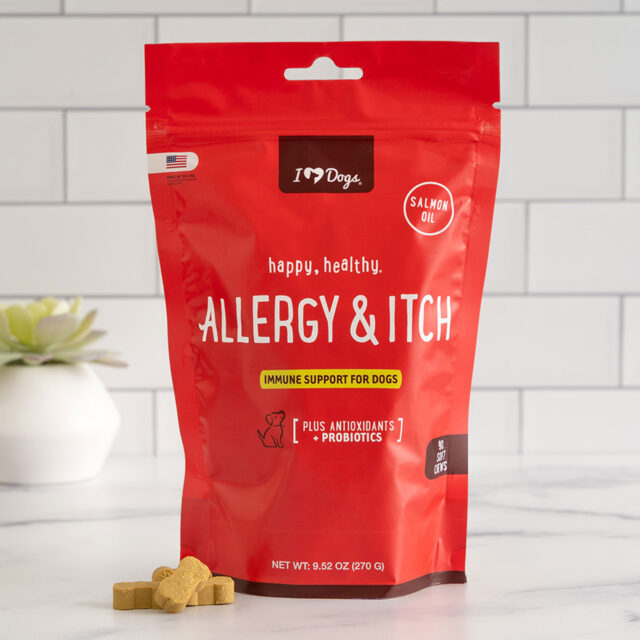

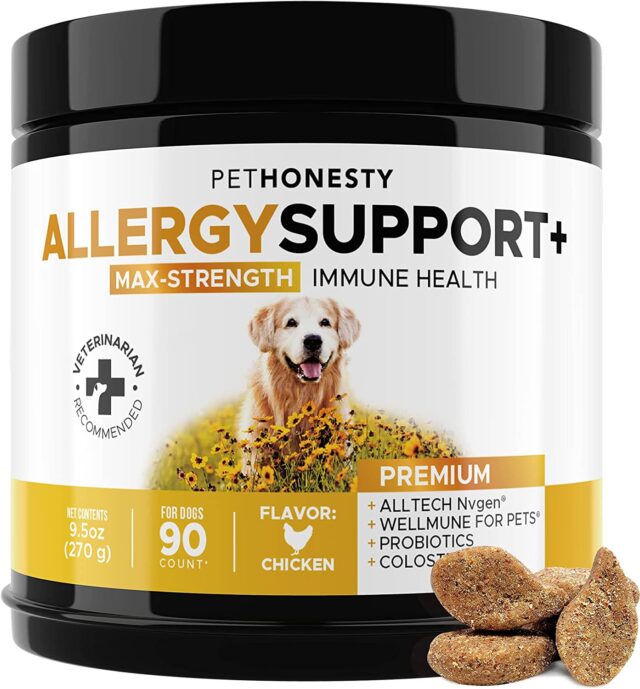




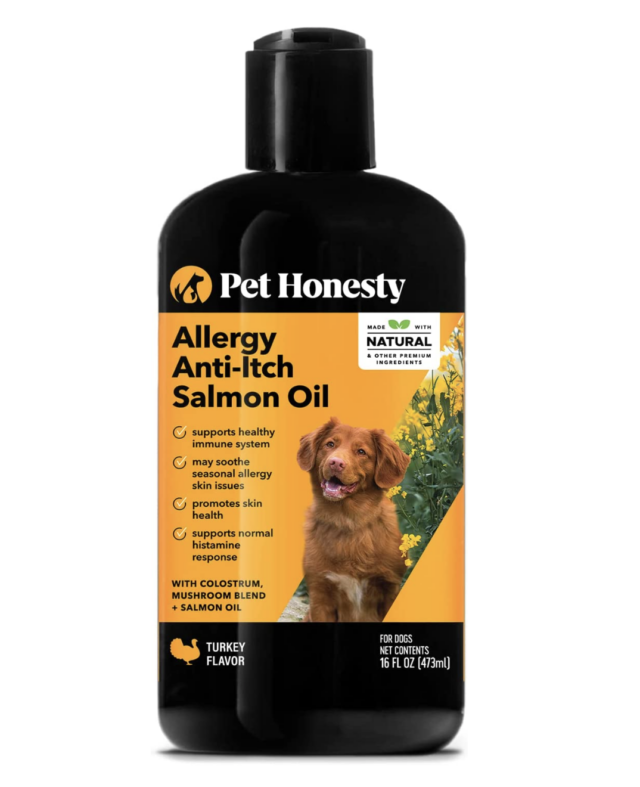
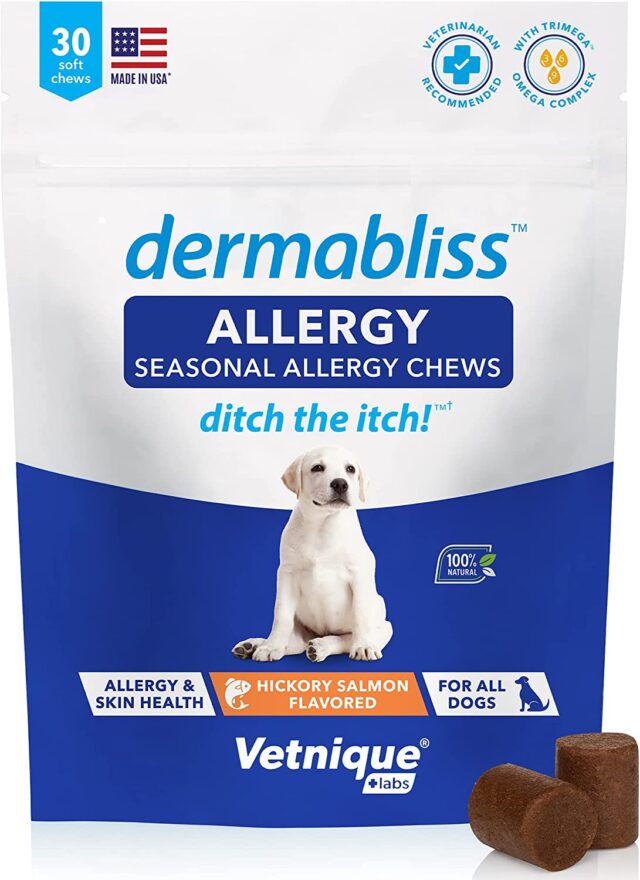
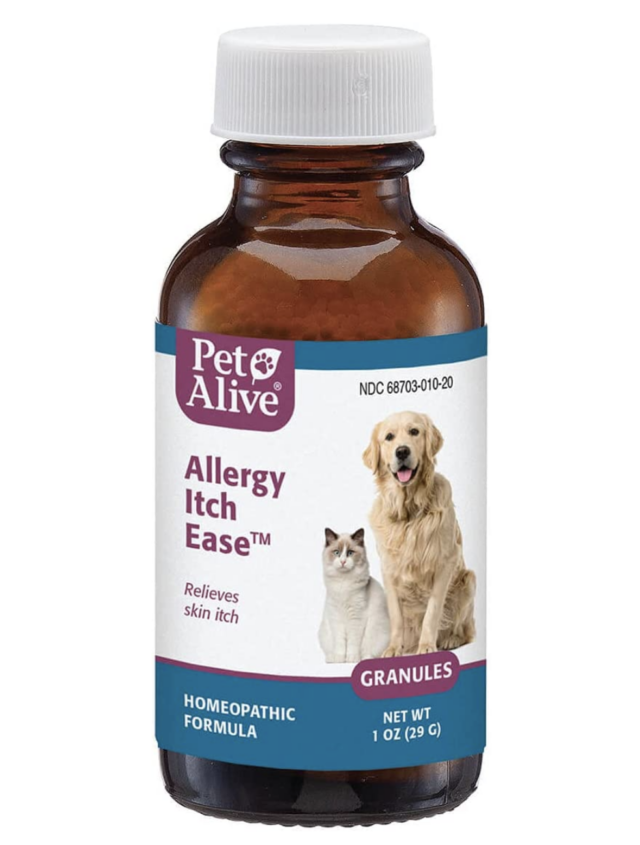
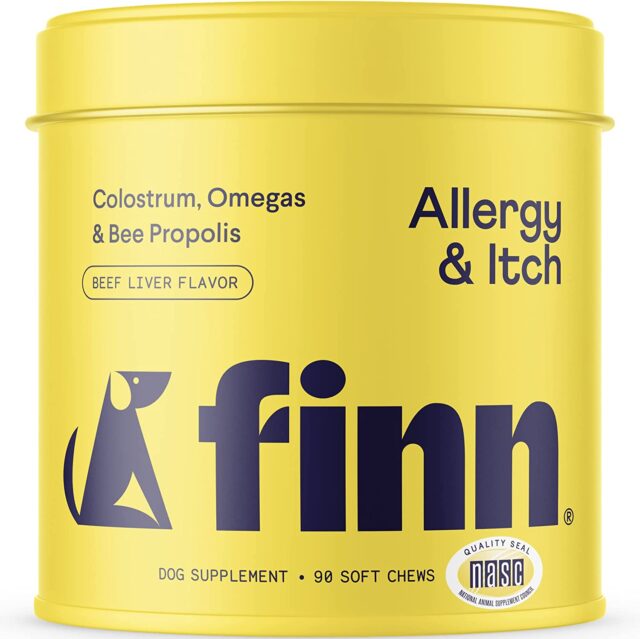
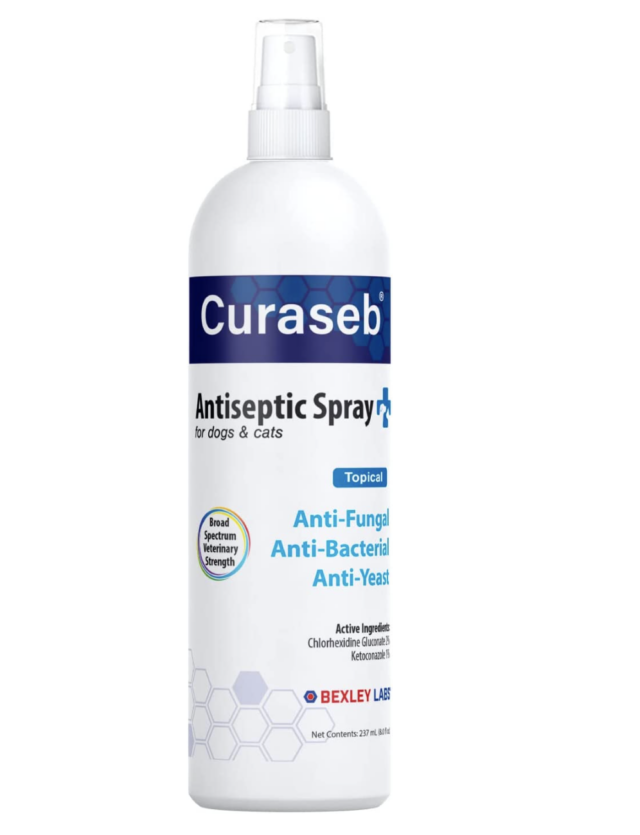
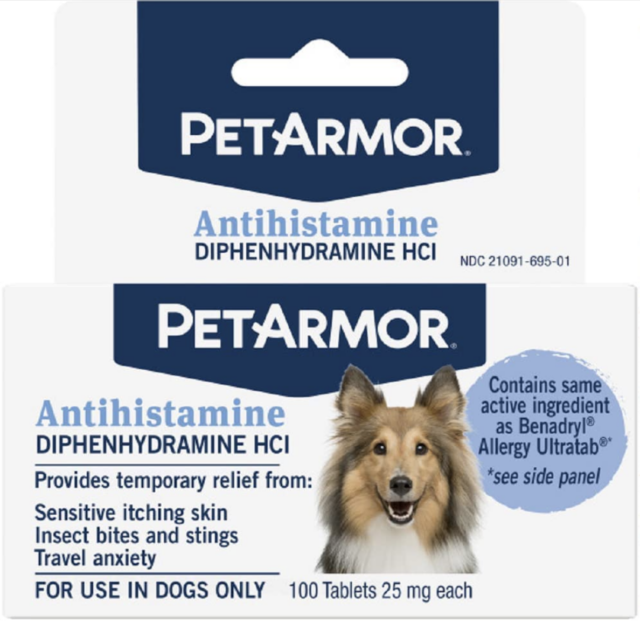
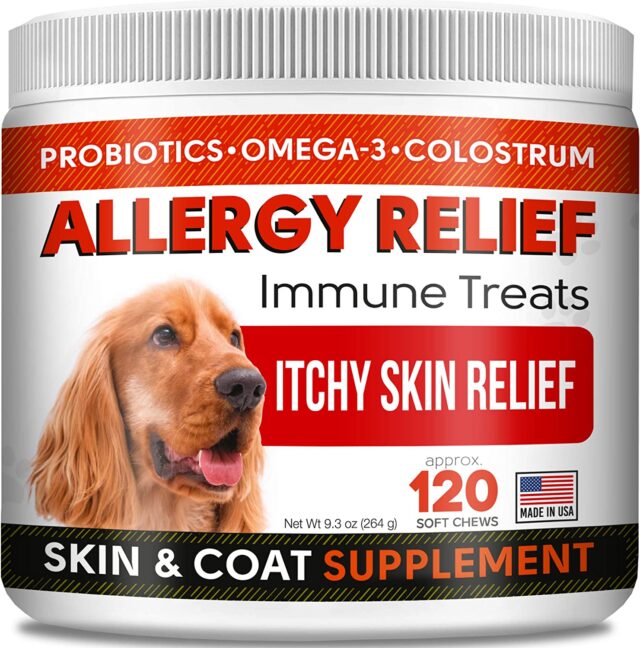
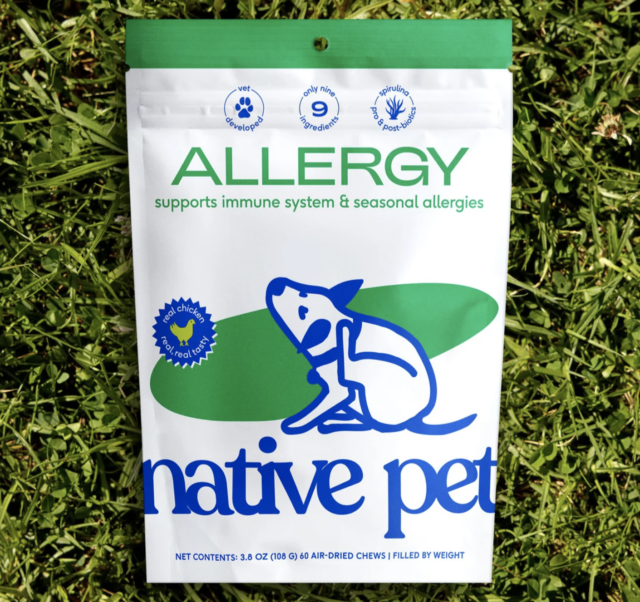

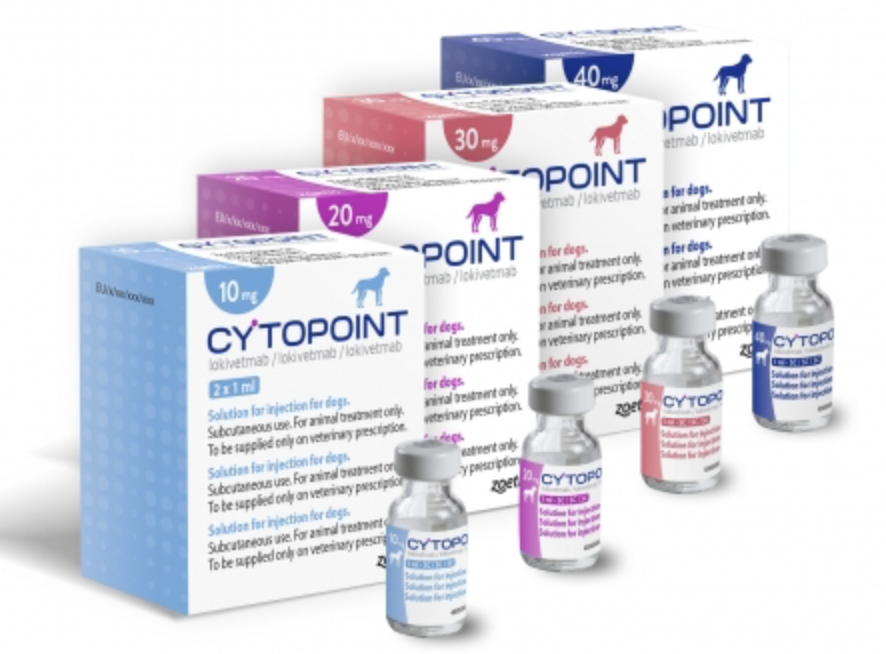

 Toledo, United States.
Toledo, United States.